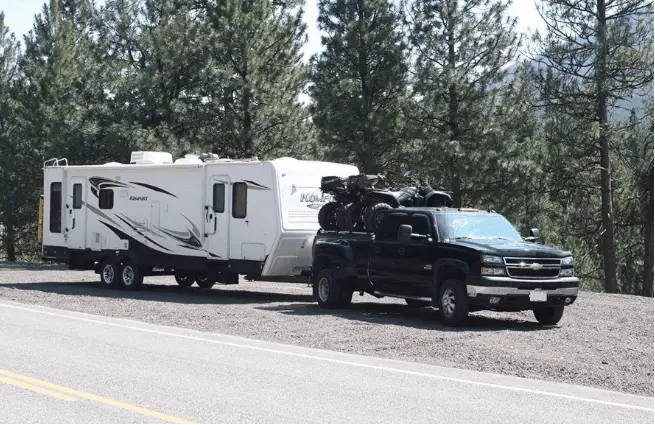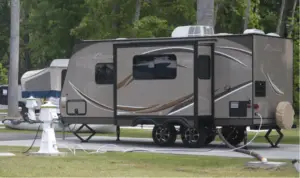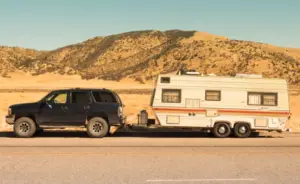Congratulations on buying your very first RV ever.
Being a new owner of a new RV brings a wave of joy, imagining the epic time you will have on the road, the places you will visit, and the fun you will have.
But it also brings a sense of responsibility; to stay safe on the road, to be prepared so that you can have the mental peace to enjoy your road trip, and to take good care of your vehicle.
All this is necessary not just to keep your vehicle functioning for an extended period of time but also prepared so that you can have the mental peace to enjoy your road trip to the fullest.
Helpful Tips for New RV Owners
I’m sure you must have started taking guidelines from RV owners in your friend circle regarding the care and maintenance and tips and tricks of utilizing your RV to the max.
But all this information is clustered and based on personal biases, which makes it useless. What you need is an ultimate guide from professional sources, like professional blogs from experts.
Gathering all the necessary information from various websites can be intimidating, and we understand that. But fret not, because we have composed this article to help new RV owners, such as yourself, get all the necessary tips and tricks to stay equipped on your upcoming adventures.
So, let’s get started!
Get the must haves
This is probably the very first question that pops into the mind of every new RV owner planning for their road trip. After all, an RV isn’t the only thing you need to start with your journey, is it?
Here are some of the essential must-haves for RVs that come in handy in full-time RVing and weekend camping alike:
1. Drinking Hose
The very first essential is a ready-to-use drinking hose. Simply connect it to your freshwater tank and get fresh drinkable water any time you want. Quick tip, connect the two ends of the hose to ensure nothing climbs into it when not in use.
2. Sewer Hose
Another RV essential without which you couldn’t even imagine going camping is a sewer hose. These come in many different sizes, but we recommend you invest in a 15 to 20 inch one.
3. Sewer Connector
You can’t make use of a Sewer Hose without a Sewer Hose Connector, can you? Now, as gross as it might sound, we suggest you go for a clear elbow-shaped sewer hose connector so that you know when it’s all done.
4. Disposable Gloves
Another essential that goes with sewer hoses are disposable gloves. And I think the purpose of wearing them while touching the sewer hose and its connector is self-explanatory.
5. Leveling Blocks
Even if you have all the essentials for your RV but don’t have Leveling blocks, your preparation isn’t complete! When you set out for an adventure in the wilderness, you will find that even the most levelled sites aren’t levelled enough, and this is precisely where these blocks come in handy.
6. Generator
Another RV must-have is a generator. You can find many portable generators for boondocking or dry camping online at affordable prices.
7. Dehumidifier
If you’re travelling in the summertime, humidity might be the only thing to ruin your experience, and before it does that, you should use a dehumidifier to get rid of the musty smells. Plus, it also doubles as a laundry drier.
8. Instant Pot
Meal preps in RVs are much more manageable with Instant Pots. Not only does it do pretty much all the work on its own, but it also saves on gas.
9. Cast Iron Skillet
‘There is no use of carrying cast iron skillets in RVs,’ said no one ever. Carry one around and thank us later for those steaks over a bonfire!
10. Coffee Maker
If you are like most Americans, then it is likely that coffee runs in your veins and not blood. Keep that fuel coming by keeping an Espresso machine or a coffee maker in your RV at all times.
RV Hacks to Make Your Life Easier
No matter how prepared you are, you will always find things struggling to annoy you and make your road trip a disaster. Here are some life hacks that will make your life easier on your upcoming RV adventure:
1. Show Rack Storage
Running out of space in your RV to store supplies? Shoe racks are a great way to create instant storage, just like a hanging drawer with multiple compartments.
2. DIY Travel Cup Hack
Does your coffee keep spilling all over your RV? Use cling film to seal the cup, insert a straw and sip away.
3. Command Hook Curtains
Create temporary separation inside your RV without drilling holes. Use command hooks to hold up your curtains for a screw-less separation.
4. Easy Scrambled Eggs
Break eggs in an empty water bottle, add the spices, close the lid and shake like crazy before putting it in a pan. This mess-free hack will save on washing a bowl and a whisk. Breakfast is sorted.
5. Collapsible Trash Cans
RV owners know that no space is ever enough, especially to accommodate essentials like large trash cans. Collapsible trash cans make great impromptu trash storage and save on space.
Save Money in Your RV Trip
Why would we want to save on RV road trips, you ask? Think of it this way, every penny spent on an RV road trip could be invested in something adventurous. So, if you have a habit of unconsciously overspending on tours and trips, you should check these tips on how to save money on RV trips:
1. Find and Use Coupon Codes
There is off-season in RVing when almost all the camping spots and activities hubs offer promotional discounts to attract RVers. Search for places that are offering discounts to save on extra overheads.
2. Run an extra mile to save on gas
As absurd as it may seem, consider driving a few extra miles to fill up on stations that have relatively lower gas prices, even if the difference is by a few cents. Why? Because RV tanks can hold up to 150 gallons of fuel, which adds up to a hefty sum.
3. Use the Kitchen You Paid For
When you bought an RV, you paid for everything in it, including the kitchen. So make use of it! It’s always cheaper to cook yourself or get homemade food canned, to save on the time it takes to cook.
4. Consider Boondocking
Even though the campground fee is nothing compared to the hotel fee, it is always much compared to dry camping. Camp on public lands in your own tents to save on those $15 per night.
Maximize the Space in your RV
Like I said before, no space is ever enough in RVs, and you can’t do much about it. But what you can do is to utilize the available space effectively. Here are our top tips on how to utilize the space in your RVs efficiently:
1. Use camping specific household items
2. Reduce your weight by eliminating unwanted items
3. Consign places for everything
4. Use your wall space to hang stuff
5. Use divided organizers in drawers to create compartments
6. Hang items on the inside of cabinet doors
7. Install drawers under tables
8. Hang shower essentials in shoe racks
9. Put shoe racks under or beside beds for added storage
10. Use square-shaped containers rather than round ones.
Tips for Storing your RV
Until now, we have been discussing tips and tricks that will help you in your RV voyage, but now, we will start with discussing tips for maintaining and increasing the life of your RV. Here are some of the savviest tips on how to store your RV after a camping trip:
1. Clean it Up
Give your vehicle a good wash from the inside out after each use. Waxing is also a great way to protect it from sun damage.
2. Drain it Dry
Drain all the water from the plumbing system and the water storage tank to avoid chancing of freezing.
3. Let the Air In
Unless you want the doors and window sills to get rusty, allow space for air to pass through the vehicle during storage.
4. Power Down
Make sure your RV batteries are fully charged before storing them for an entire season unless you want to undergo the hassle of charging them when you are all set to leave for vacation.
5. Where to store?
This is probably the biggest question when it comes to RV storage. There are multiple options for storing an RV:
Friends’/relatives property
RV parks
RV storage lots
RV maintenance and repair workshops.
Protect Your RV from Water and Sun Damage
Here’s how you can save the exterior of your RV from the harsh climate during storage:
- Perform regular inspections of the roofs and windows.
- Take it on short drives regularly to keep the engine working.
- Repair any damage caused to your vehicle then and there.
- Inspect all the seals and seams.
- Wax the vehicle’s exterior to protect from harmful UV rays.
- Winterize your RV.
Wondering what winterizing is? Great, because that is just what we are about to discuss:
How to Winterize your RV?
Before putting your RV on hibernation mode, it is suggested that you winterize it thoroughly so that the vehicle bounces back to life in a better shape than ever. Here are the steps to follow while winterizing your rig:
1. Start with winterizing your water system.
2. Charge and remove your batteries and store them in a dry place
3. Apply a good coating of wax or protectant on the RV’s exterior
4. Clean and dry the vehicle’s awning
5. Clean and remove the AC filters
6. Service all locks and oil the hinges
7. Tidy the interior
8. Dehumidify to avoid mold build-ups
9. Cover the wheels.
How To Dewinterize your RV?
Now that you have winterized your RV, it is guaranteed to survive the harsh, chilling winters. And whenever spring arrives, you will only have to de-winterize it before letting it out on the roads. What? You didn’t expect to take it out of the garage and start driving right away, did you?
Here are the steps you will have to follow to reverse the winterizing of your RV:
1. Check your tires
2. Inspect the exterior
3. Reinstall the batteries
4. Flush and sanitize your water system
5. Check for leaky pipelines
6. Replace propane tanks
7. Check the engine
8. Test your RV generator
9. Change filters
10. Check windows and air vents
11. Restock first aid supplies
12. Service your AC and refrigerator
13. Renew your insurance.
That’s basically it!
What Not To Do On An RV Road Trip?
Approaching the end of this article, I would like to add a few tips on what not to do on RV road trips so that you how to steer clear on your next RV camping adventure:
1. Filling up at normal gas stations – always visit truck shops specializing in fueling large vehicles.
2. Driving through storms – while it is hazardous to human life, it may also damage the body of your rig.
3. Packing Electronics – why pack that Wi-Fi device campgrounds offer spotty internet connections?
4. Buying a Day Pass at Parks – the costs of these expenses is insane.
5. Over-stocking on food – try replacing canned food items with pre-prepped frozen meals.
6. Parking Solo – unless you want to lose your RV at a parking spot in the middle of nowhere, park with fellow RVers.
7. Bringing Too much water – bring a few gallons along and fill up whenever the container empties.
8. Skipping reservation – trust me, the last thing you would want on a camping trip is to find no spot to camp just because you thought there was no shortage of camping spots.
Summary
RVing is more of a lifestyle than just a recreational hobby and can put loads of inspections and preventive measures on your plate. But the end reward – the priceless moments of joy, makes all the efforts worth it. Now that you know how to plan to enjoy yourself to the fullest in your next road trip, there is only one task left for you to do; to enjoy yourself to the fullest!





